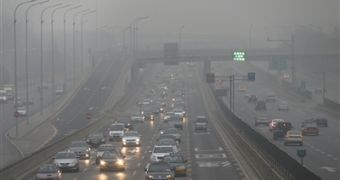Starting last Friday, whopping amounts of soot (i.e. impure carbon particles) and other harmful chemical compounds have begun accumulating in the air above some of China's major urban areas, hence the country's now experiencing toxic levels of atmospheric pollution.
As a result of this sudden drop in local air quality, authorities were left with no choice except ask people to remain indoors and only leave their homes if they had urgent matters to solve.
Given the fact that is has been quite a while since Beijing, Chengdu and other major cities in northern and western China have last experienced such a long-lasting air pollution spike, some people have gone as far as to argue that the country is facing a so-called airpocalypse. The Times of India reports that, according to measurements carried out by researchers working for the Beijing Municipal Environmental Monitoring Center, the air in said Chinese regions now contains over 700 micrograms of PM2.5 particulates per cubic meter.
Seeing how the World Health Organization lists a concentration of 25 micrograms of PM2.5 particulates per cubic meter as a tolerable and safe one, it need not come as a surprise that the country's residents are anything but willing to venture outside the safety of their homes.
“This is really the worst on record not only from the official data but also from the monitoring data from the U.S. embassy -- some areas in (neighboring) Hebei province are even worse than Beijing,” argued Zhou Rong, an environmentalist presently working with Greenpeace.
According to the same source, these dangerously high levels of air toxicity have also translated into several flights being canceled and into traffic being disrupted to a considerable extent.
This was because the thick fog that engulfed this country led to reduced visibility.
The country's high officials expect that the situation will begin to improve this coming Wednesday, and advise people to do their best in avoiding becoming exposed to the toxic air until then.

 14 DAY TRIAL //
14 DAY TRIAL //